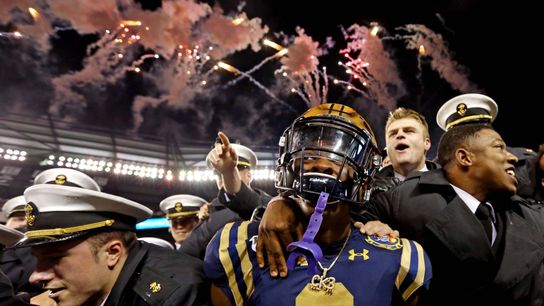It's common at this time of year for players to see their NFL dreams realized then dashed in a matter of days. The NFL labor market is such that there will always be more qualified applicants than available jobs, and so many talented players will see their professional careers last no longer than a couple days at a rookie minicamp. But Cameron Kinley's premature exit from the NFL is a new one.
A standout corner for Navy, Kinley went undrafted but later joined the Tampa Bay Buccaneers with legitimate hopes of joining the defending Super Bowl champions as their fifth cornerback. So good were Kinley's chances of making the team that earlier today The Athletic ran a feature story on his bid to make the team:
Bucs coach Bruce Arians called him “a tremendous young man” Tuesday, saying he “got goosebumps” as he watched a video of his graduation speech.
Not only did Kinley, a 3-year starter, excel on the field, he shined in the classroom and off the field as well. He served as his class president and shared a stage with Vice President Kamala Harris at the Naval Academy's commencement ceremony last week. As recently as April, the Academy was full-systems-go on getting Kinley to the NFL.
Check out @ck3thethrill on @gmfb this morning!#ProGoats | #BuiltDifferent pic.twitter.com/NgaKAcb0px
— Navy Football (@NavyFB) April 22, 2021
“Cam Kinley represents everything that we’re about,” Navy coach Ken Niumatalolo said of his player last month. “He’s a hard worker, selfless, was a really good student here, and that’s hard. To be a great student, be a good football player, a good midshipman, to juggle all those, I’m amazed at these guys. All that and he was a class president. I can’t fathom all the responsibilities at that age."
All that changed Monday, though, when it was revealed that the Naval Academy has denied Kinley's request to delay his mandatory 5-year conscription, all but ending any realistic hopes of an NFL career.
Kinley, understandably, is miffed at the decision.
"Currently, I have four other counterparts who have not been denied the opportunity to participate in the NFL: Jon Rhattigan (West Point/Seahawks), Nolan Laufenberg (Air Force/Broncos), George Silvanic (Air Force/Rams) and Parker Ferguson (Air Force/Jets). While I imagine that these men are from different branches of the armed services, it puzzles me as to why I am the only person to be denied this opportunity."
Not only that, Kinley is being treated differently than a couple of his fellow recent Navy graduates. Keenan Reynolds left Annapolis was named the American's offensive player of the year in 2015 and joined the Baltimore Ravens in 2016. Even more recently, Navy quarterback Malcolm Perry won the AAC offensive player of the year award in 2019 and joined the Miami Dolphins as a seventh-round draft pick just last season. He made the team and caught nine passes last fall.
So Kinely is entirely justified in his public frustration why a 2020 Naval Academy graduate was allowed to go directly to the NFL while he, a 2021 graduate, was not.
I can't pretend to be an expert on Naval Academy policy, but the explanation could be so simple as to a change in policy reflecting a change at the top. The Trump Administration policy was to allow players fortunate enough to make NFL rosters to immediately do so, reasoning that placing players on NFL rosters would serve as an effective recruiting tool for the service academies
A new administration is now in the White House, and so perhaps the Naval Academy has chosen to revert back to the old policy.
If the explanation truly is that simple, it's easy to see how the Naval Academy got there.
Using the NFL as a recruiting tool could send a mixed message. The point of the Naval Academy is to train officers to serve the country, and the point of the Navy football team is to promote the Academy, not to develop future professional football players. The move is unlikely to hurt Navy in recruiting, since no one -- no one in their right mind, anyway -- signs with Navy football as a means of getting to the NFL.
Reverting back to the old policy is a move consistent with the Academy's history.
Roger Staubach won the Heisman in 1963, was drafted by the NFL and the AFL the following spring, but did not join the Dallas Cowboys until 1969. David Robinson was selected first overall in the 1987 NBA draft but did not report to the San Antonio Spurs until '89.
Still, it's easy to sympathize with Kinley. Reynolds and Perry's precedents are much more recent than Staubach and Robinson, so it's clear to see why Kinley believed he would be treated like the more recent pair.
And if the plan all along was to deny Kinley's request, for the Navy to demand its five years of service now and not later, it begs the obvious question: Why let him take part in the NFL draft/free agency process at all?
